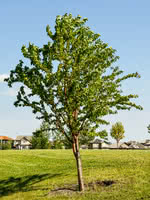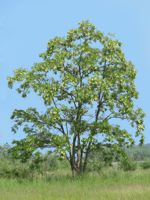Mon-Fri 9am - 5pm Mountain time
Amur Cherry vs Black Locust
Prunus maackii
Robinia pseudoacacia
NOT AVAILABLE THIS SEASON - MIGHT RETURN
SOLD OUT
Amur Cherry is a beautiful, fast-growing ornamental tree. It features attractive bronze/red bark that peels horizontally in strips.
This hardy tree bears white flowers in the spring, black fruit held in clusters in the late summer, and pointy leaves that turn yellow in the fall.
Black Locust is an attractive tree. Its distinctive leaves are made of about a dozen bright green leaflets. It also notable for its fragrant white flowers, which smell of citrus.
Black Locust can grow in many situations, but prefers dry areas with lots of sun. It is robust and is an excellent choice for establishing shade in dry, open areas.
Important note: Much of the Black Locust is toxic to humans and livestock, including seeds, bark, and leaves.
Amur Cherry Quick Facts
Black Locust Quick Facts
Toxicity: toxic to horses, cattle, etc.)

